On finances and savings
Date:
Let's tackle another social topic that's typically not talked about due to stigma, shall we? I've had lots of discussions with people in private about finances, savings, the importance of purchasing power parity (PPP) or lack thereof and it feels like there are as many opinions as there are people.
Yet, in the spirit of letting my voice be heard, i'd also like to share my opinions on these topics. In my mind, talking about them, regardless of how that might make us feel, is one of the few ways of normalizing them, which will hopefully lead to people making better and more responsible financial choices.
My finances
Without further ado, let's jump in! And in the pursuit of openness, let me share how much money i make, something that everyone is always shy about because they link their personal worth to how much they earn. Here is how my monthly income and yearly total income has changed in the past few years, as a software developer in Latvia, working for a local company. I got the following data by exporting all of my bank data as CSV files and then just running the following:
grep -e "$COMPANY" ./*.csv > total-wages.csvThat allowed me to get a summary, which i could then feed into LibreOffice and get the following output. Here's my yearly earnings total compared to what the average person in Latvia makes, from 2017 to 2021 (the current year's remaining months use projected figures based on my earnings so far):
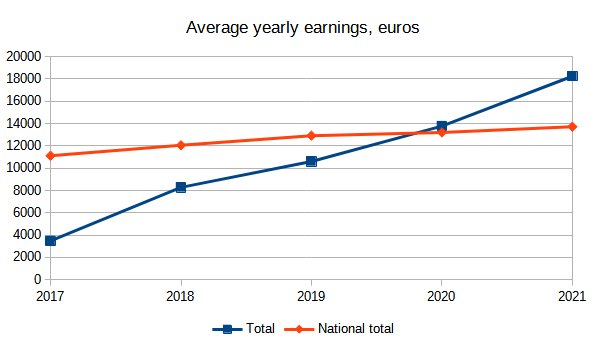
Furthermore, it's also possible to get this data as a monthly figure, based on the average earnings each year, which yields the following picture:
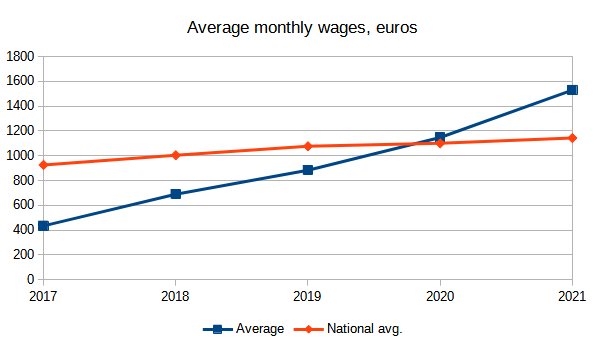
And if you care about the raw data, here's the pivot table that i made for each year, while taking the average national figures from the Central Statistic Bureau (CSB) of Latvia:

Of course, i should probably mention that for a few of these years i was studying for my Bachelor's and Master's degrees in parallel to working, so instead of doing 40 hours per week, during some of those years i mostly did 20, which is why the figures vary so much. Also, i probably should mention that these are the net salaries, which are after the taxes - this is all of the money that i get to spend on rent, food, utilities, clothes, or any other things that i require in my daily life.
That's not the full picture, of course! After these years, it's also useful to look at the savings and investments that i have in my bank account, so here's a full look into that data as well:
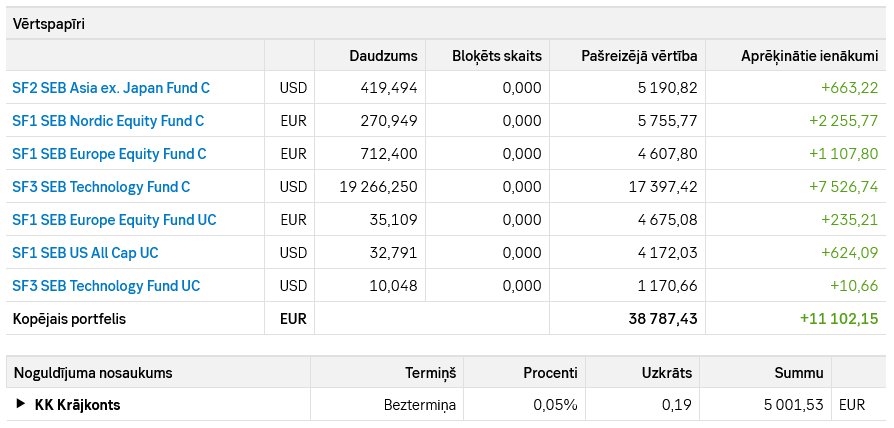
To translate, after these years, i have a total of 38'787 euros in investments (11'102 of which is approximate earnings), as well as 5'001 euros in savings. So in total, i've managed to save up 32'686 euros of my own money over the years. If you look at my total income, you'd find that it's 54'350 euros, so in essence about 60% of all of the money that i've made has been put into savings or investments, while 40% of that was necessary for me to live.
These figures don't match up with my salary data exactly, since there was about a 100 euros per month that i received from my university as a stipend (though paying for their dorms essentially cost me all of it), there was the occasional freelance bit of help for someone else, as well as the occasional award from a programming competition, such as a PS4 console, which i sold to my buddy so i could afford dental fees and then had some money left over. Essentially, i had humble beginnings, my parents helped me with paying for the dorms initially and so on, but it still should give you a rough idea about how i live a fairly spartan lifestyle of no excesses or fancy belongings.
So what does that mean?
For starters, i'm pretty decent at saving money. Currently, because i don't have to be in office because of the COVID pandemic, my monthly expenses are usually below 500 euros here in Latvia, so with my current monthly average earnings of 1'500 euros, that means that i can save or invest about 1'000 euros every month, which is well above half of what i make and generally well above what people usually suggest others to save.
However, at the same time, i'm pretty poor! If i were to show this article and these figures to the lovely people over on /r/cscareerquestions, they would probably gasp in horror about how some software developer could earn so little money! And to be honest with you, they wouldn't necessarily be wrong either! For a second, let's look at levels.fyi to see how much developers make in some of the FAANG (Facebook, Apple, Amazon, Netflix, Google) companies yearly in US:
Personally, i have about 5-6 years of professional experience (depending on whether you count freelancing or not), so i'd probably be a decent L4 developer, which means that people who do vaguely similar jobs overseas make anywhere from 200'000 to 300'000 dollars per year, or 170'000 to 254'000 euros per year. Even if we consider that the projects that they work at are much larger scale and more complex, even if we assume that my years of experience count for nothing and that instead i'd be a regular L3, then that figure is still 85'000 to 170'000 euros per year. Even if we assume that they have to pay large amounts of taxes there and have more expenses, then that figure is still many times larger than what i make.
So, what gives?
Thankfully, i don't even have to shuffle around hand wavy figures, because there are statistics available online for disposable income that people have, which can easily be found online, which gives us a bit better of a look at how these earnings differ:
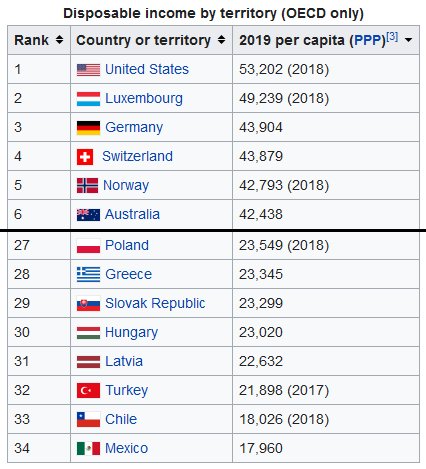
The picture above has the mean income listed, however you can also visit the link to have a look at the median income, which roughly halves this amount for Latvia and somewhat decreases it for the US and other countries.
There are also some attempts to put this data on a map, which gives a slightly more visible picture about what role geography and history could play in how these numbers have turned out. Here's some data from 2015 about disposable income, which i found on this site:
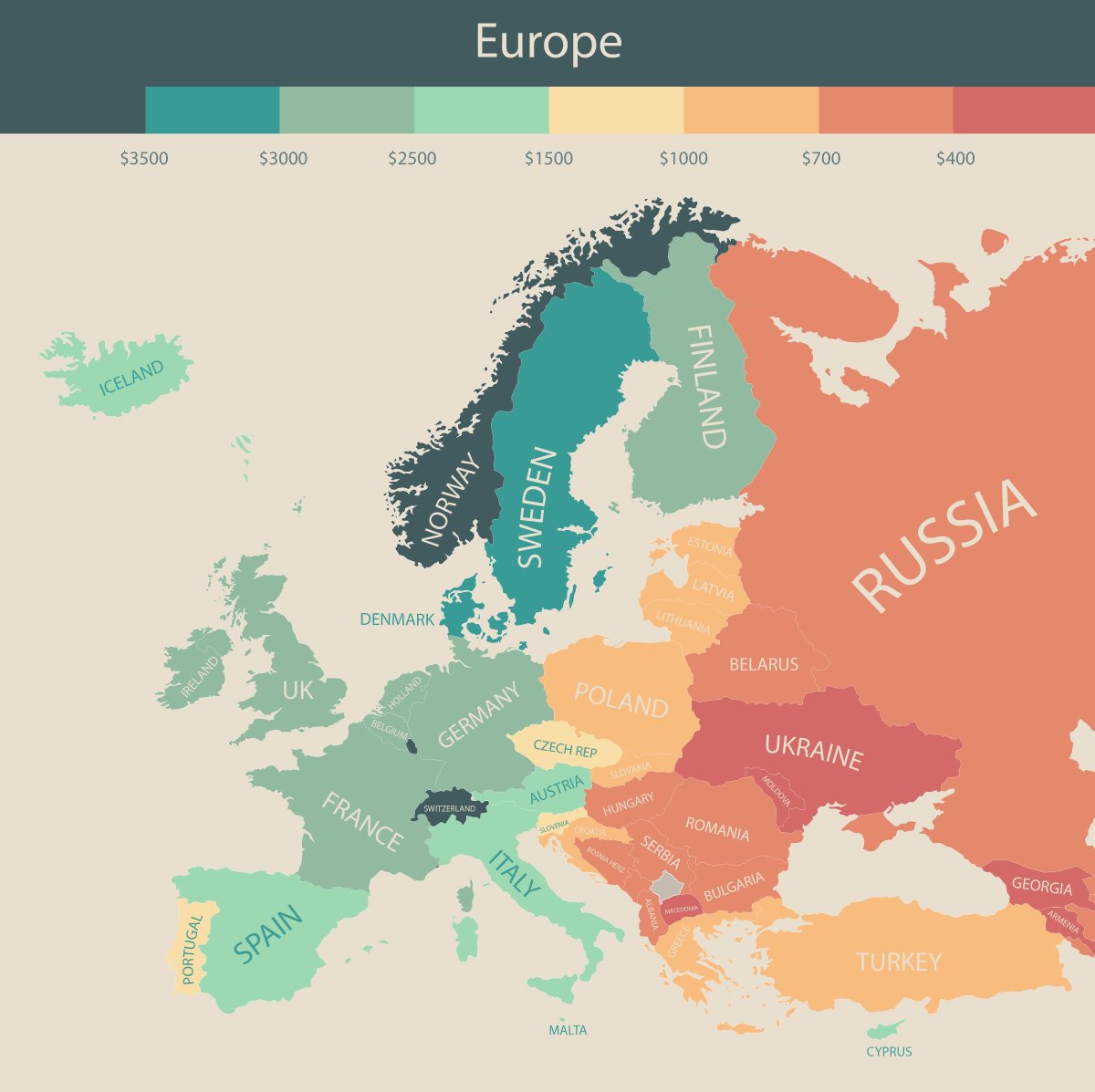
Now, in regards to the map, one of the things that people usually mention in this regard is that you can't just take these raw figures, but instead have to take purchasing power parity (PPP) into account, since many products cost different amounts based on where they're manufactured and sold.
I don't entirely believe this statement, which i'll explain below, but if you look at the other images apart from the map, the picture is still pretty much similar - some countries have their people do way better on average, even when you take the costs of living into account:
I don't claim that this data is able to perfectly describe the living situations everywhere, however i'll get to why it matter shortly. For the time being, i'd like to also address some of the claims about the unique drawbacks that people in different places of the world face.
For example, you also oftentimes hear about how college tuition and student debts take away large amounts of people's income, which isn't cleared even after bankruptcy! With that, i do have to agree for the most part - i studied in Riga Technical University for both my Bachelor's and Master's degrees and i didn't have to pay almost anything for this, but that's only because i was either smart or lucky enough to get into the budget group. Back when i applied, i scored somewhere around rank 11 out of ~220 places that they had within the budget - anyone outside of these places would have to pay if they wanted to study. That said, i cannot and will not deny that the education industry within certain countries such as US can be downright predatory.
The other things are healthcare and its costs - if you don't get it in the US as a part of your insurance package, then you're likely to be bankrupted by an ambulance ride. It's some odd cabal of insurance companies and the healthcare industry being in cahoots and inflating the prices of everything and anything to an unreasonable degree, with no governmental limitations or effective oversight in place. That said, Europe probably isn't the pillar of hope that some people claim it to be anyways. I've personally donated to other people on ziedot.lv for their medicine, which they could not afford themselves and which the government wouldn't cover. Let me tell you - despite how much people praise Europe, having to crowd source healthcare feels disappointing, especially when you get your donation back with the message that the person no longer needs the medicine because they couldn't afford the full dose and died.
Admittedly, that got a bit dark for a moment there, but there are many facets to all of this which simply cannot be ignored. Regardless, i think that in my situation it's pretty clear that perhaps i'm a tad underpaid, both as a software developer locally, as well on the global scale. Here's a comparison from algas.lv, a crowd sourced platform that attempts to give some of this information to you:
But why does it matter?
I've often heard people say something along the lines of the following:
Happiness lies not within how much money you make, but whether you have enough for your needs.
I don't disagree with the saying, however i think that too often it gets used as a method for the disadvantaged to cope with their circumstances. Claims like "Money doesn't buy happiness" are short sighted, lacking actual substance and oftentimes are little more than virtue signalling - saying things that will make others appreciate you more because they're so agreeable that you'll almost never find someone who'll be opposed to them.
But the numbers don't necessarily agree with that statement. For example, let's look at how much money i would be able to save as a person in Latvia over 5 years, versus how much an average person from the US would be able to save. Let's use the data source for the map and forget about purchasing power parity for a second, which i'll explain. Now, the graph that we get is a bit like the following, or at least would hold true if the salaries didn't change from those of 2014:
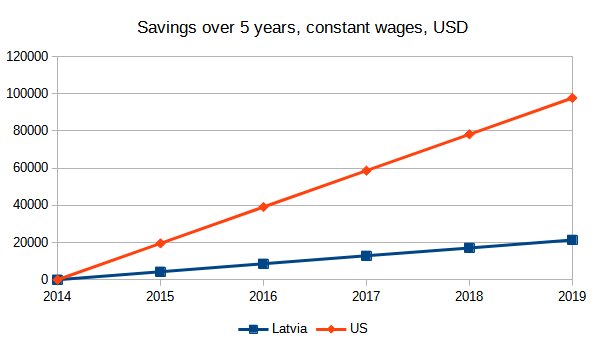
Here's the data that i used as an example:
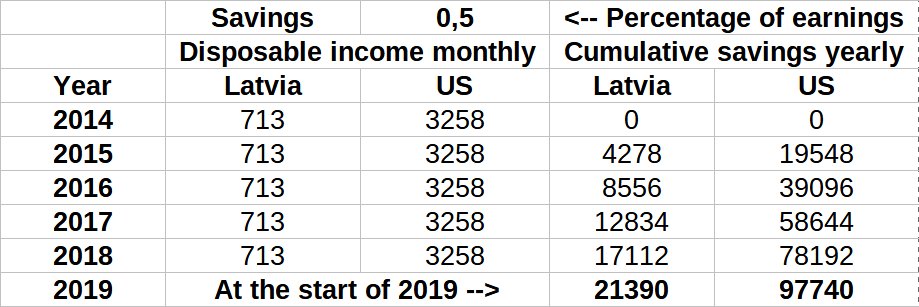
But let's not stop there. Let's instead assume that the economy is slowly on the rise and extrapolate these savings over 10 years with slightly increasing wages, assuming similar increases as we saw from 2014 to 2021, without any major crises. Furthermore, let's add a multiplier on top of these numbers, to offer us a rough insight about how much a professional in a well paid position such as software development could make:
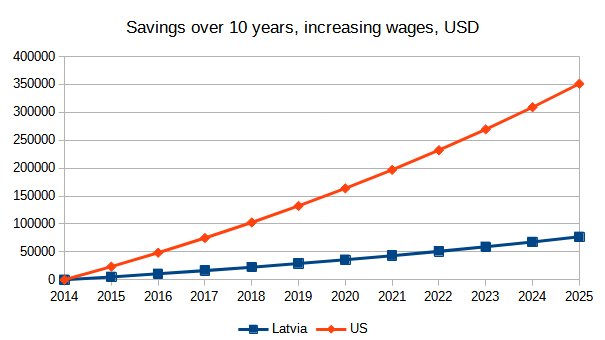
And here's the data that i used for this example:
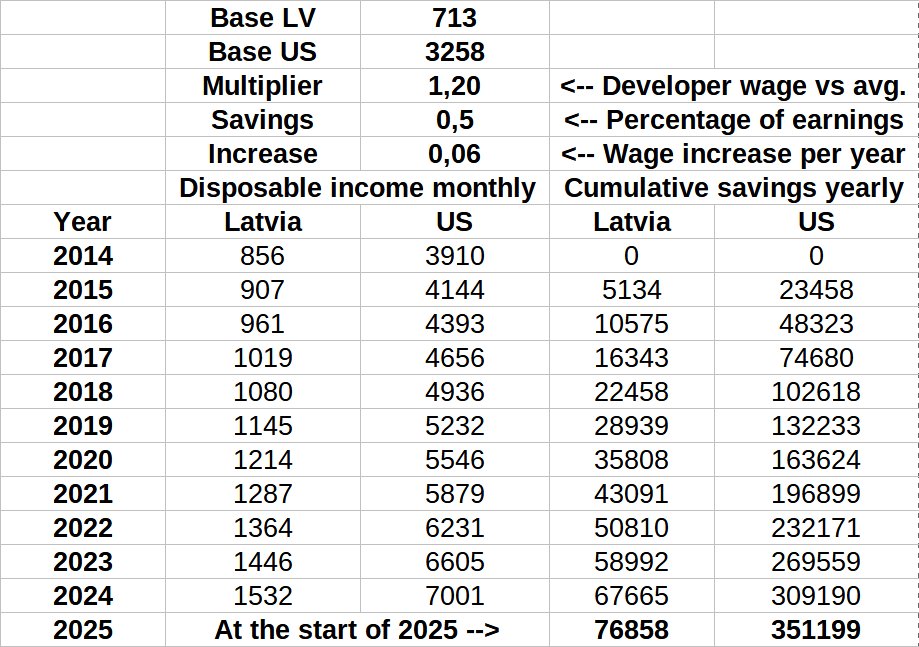
Hopefully all of this data being fake, even if it's pretty believable, should both not offend anyone, but also serve to illustrate the point that i'm about to make. But before i do that, i would like to also let some other data speak for me. This time, let's go over to an AWS Price Calculator and see how much it would cost me to run my own little SaaS platform with about 4 mediocre VMs for those 10 years:
Disclaimer: i'm using the on-demand pricing which is more expensive, but can also be your only option when you cannot afford to pay for a year ahead of time.
The costs could be around 1'406 USD per year, which would work out to 14'060 USD per this 10 year period. And then, when you compare these expenses with the savings above, you get the following:
- for the Latvian developer, that would cost them around 18% of all of their savings
- for the US developer, that would cost them just 4% of all of their savings, giving them ample breathing room
Do you see where i'm going with this? Purchasing power parity is a lie within a globalized economy!
This does make things like running multiple non-profit projects more complicated, as does severely limit the amount of resources you can provision and utilize in the background. Of course, one of those people could also invest the money into real estate, whereas the other probably simply wouldn't have enough, given that the prices of real estate are on the rise. Apart from that, there's also the fact that compound interest of investments could end up in a pretty substantial amount over time, so the bigger your investments, the bigger your earnings, to the point where one of those people could probably live off of dividends comfortably, following the /r/FIRE lifestyle. Of course, that's not what i'm talking about here, since there's a simpler truth to be acknowledged.
When you want to purchase cloud servers from AWS, they don't ask where you're from so they can charge you 5x less just because you're in a comparatively poor country. When you want to purchase an iPhone or an Android phone, or a laptop, or server hardware, or a car, or a radio or any other piece of high end technology that's developed abroad, the pricing differences are most likely minuscule. And even when you want to build up any sorts of savings so that you have breathing room in case you end up seriously ill, injured, homeless or even get fired from your job due to downsizing or anything else, you will care for every bit of savings that you can make.
But there's something else that i didn't touch upon. What about my company, which pays me around 1'500 euros per month? Are they also similarly impoverished, or are they simply taking advantage of the geoeconomical situation to pay me less? Thankfully, i visited Lursoft and also had a look at at their yearly overview for 2020, to see how well they're doing financially. That gave me the following figures:
Income 6'154'314 euros
Expenses 4'274'870 euros
Gross earnings 1'879'444 euros
Net earnings 1'347'942 eurosSo, the company as a whole had net earnings of over 1 million euros in the last year. There is definitely something to be said about investing in improving the working conditions, the office (should that be relevant) and so on, but at the same time it feels like technically they'd have breathing room to pay their employees more. For example, if we consider that the company has approximately 100 employees, then each employee brings it 13'479 euros in net earnings.
But perhaps not - if, for some reason, all of that money would be given to employees, instead of being used for anything else, then i'd get about 31'000 euros per year, which would still fall short of those other figures. Now, they are a business after all, so if the market doesn't dictate that they should pay me more, they are under no obligation to do so, which is understandable.
But at the same time, it feels like there's also a point to be made about how much value a certain company within the market can generate. If Google employees also brought in 16'000 dollars of net profit per year, then with a net profit of 40'269'000'000 dollars in 2020, they'd need 2'516'812 employees globally, more than my country has people. In actuality, Google had 135'301 employees in 2020, so the actual net profit that's generated by an employee is more along the lines of 297'625 dollars.
Consider the following:
- i earn my company around 16'000 dollars per year
- Googlers earn their company around 297'500 dollars per year
- that means that a Googler is worth 22 times more than i am
Sure, some companies are overvalued at the end of the day, some companies work in very lucrative markets and as a consequence are essentially swimming in cash, oftentimes being too large to fail. Yet, the bottom line is that if my life circumstances have lead me to working in a company that earns less, i can also expect to earn less, thus, my ability to make savings and prepare myself for the worst case situations that life could throw at me (like health issues) is limited.
So how do i cope with that?
My personal approach
I rent my servers on Time4VPS, a lovely cheap Lithuanian VPS provider because i cannot afford Azure, AWS, GCP or any other of the expensive mainstream platforms out there. My homelab has 200GEs which some could consider e-waste with the cheapest components that i could get - i don't need it to be performant or flashy, just an environment for me to learn in. I colocate as many of my actual services within Docker Swarm clusters and overprovision them to get the density be as good as humanly possible.
Actually, if you'd like to make my life a bit easier, have a look at the Time4VPS affiliate link above - not only could you get some cheap VPSes for any of your own personal projects, but you'd also allow me to pay less for hosting my own stuff, including this blog!
I buy some of my clothes and shoes on AliExpress. My phone cost me about 100 euros and i bought it only when my old Android phone's battery started bloating and once i realized that i don't have a backup phone should it die. Currently, i live with my parents, because even though i technically could afford my own place, that would prevent me from building up these savings. In regards to entertainment, i mostly play free to play video games, or do the occasional Steam sale where you can get 5-10 year old classic titles for a few euros. I read a lot of books, because you can also get those for cheap. I don't eat out often if at all (perhaps due to some social anxiety as well) and cook most of my own meals.
Back to the topic at hand, some people say that i don't have it nearly as bad as many in Africa, who cannot even get clean drinking water daily or who are exploited by western corporations for a few dollars a day or even a month. Others will tell me that i'm being paranoid and that i'm living too frugally. Both of them would be correct in regards to some of their points, mostly because their outlooks on life and their understandings of finances and their own personal circumstances would vary greatly.
Summary
There should definitely be more discussion about these earnings, as well as about income inequality, the implications of outsourcing, financial freedom, earning potentials and how a person can utilize their time more efficiently without wasting their potential. Maybe eventually i'll work for a company abroad remotely and will provide more value to them, improving my own financial situation. However, until that day comes, i will simply continue to not live above my means, be responsible with my finances and improve my skills as much as i can to gain marketable skills.
In conclusion, however, talking about these things does make me feel a bit worthless, as unfortunate as it is. Also, this might prompt employers to think along the lines of this: "Hey, this person disclosed how much they make, so even if we can and otherwise would offer them 5x what they make now, instead we'll offer them 2x and they'll still be happy." Because of this, i advocate for openness and transparency and am laying the contents of my wallet bare for everyone to see.
Other posts: « Next Previous »